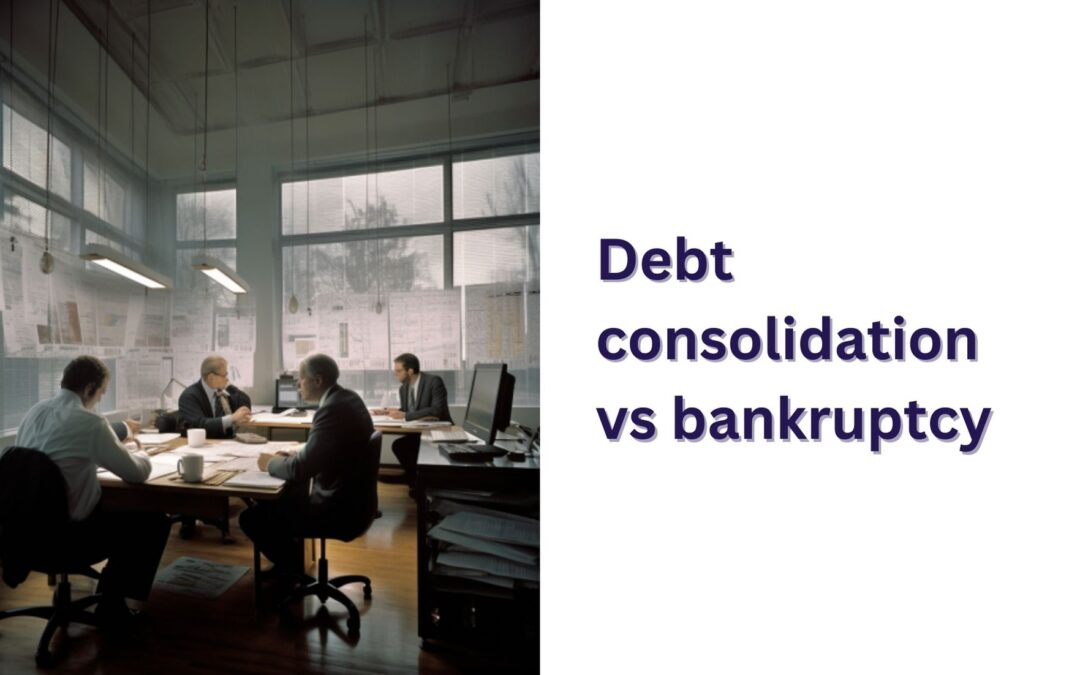Debt Consolidation vs. Bankruptcy – a choice that can have a profound impact on your financial future. When facing overwhelming debt, it’s crucial to understand the implications of each option and make an informed decision. This comprehensive guide will walk you through the key aspects of debt consolidation and bankruptcy, providing insights, advice, and expert opinions to help you choose the right path.
Have you ever though of managing your finances by saving in 24k digital gold? Download the Jar App and save daily.
Debt Consolidation vs. Bankruptcy
Debt Consolidation and Bankruptcy are two distinct approaches to managing debt. Each has its own set of advantages and disadvantages, and the choice between the two depends on your unique financial situation.
Debt Consolidation: A Ray of Hope
Debt consolidation is like a lifeline for those drowning in debt. It involves combining multiple debts into one, usually through a consolidation loan or a debt management plan. Here’s what you need to know:
Understanding Debt Consolidation
Debt consolidation simplifies your financial life by merging multiple debts into a single, manageable payment. It often comes with a lower interest rate, which can save you money in the long run.
Pros of Debt Consolidation
Debt consolidation offers several benefits. Firstly, it simplifies your financial life, making it easier to track and manage your payments. Secondly, by bundling your debts into one, you can often secure a lower interest rate, which can lead to substantial savings over time. Lastly, it can help protect your credit score, as making consistent payments can positively impact your credit history.
Cons of Debt Consolidation
However, there are some drawbacks to debt consolidation. It requires discipline to ensure you don’t accumulate more debt. Additionally, some consolidation loans may require collateral, such as your home or car, putting your assets at risk. Lastly, because you’re extending the repayment period, it may take longer to become debt-free.
Bankruptcy: A Last Resort
Bankruptcy is a legal process that allows individuals or businesses to discharge or restructure their debt when they can’t pay it back. It’s often seen as a last resort due to its severe consequences.
Understanding Bankruptcy
Bankruptcy offers a fresh start by eliminating or restructuring debt. However, it comes with significant repercussions, including a negative impact on your credit.
Pros of Bankruptcy
Bankruptcy provides relief for individuals overwhelmed by debt. It enables you to get rid of most of your unsecured debts, such as credit card debt and medical bills. It also provides legal protection by stopping creditors from pursuing you, and it offers a chance for a fresh financial start.
Cons of Bankruptcy
Nevertheless, bankruptcy has its downsides. The most significant is the negative impact on your credit. A bankruptcy filing remains on your credit report for 7 to 10 years, making it challenging to secure loans or credit cards during that time. Additionally, bankruptcy may require you to surrender some assets, which can be a difficult choice. Lastly, not everyone is eligible for bankruptcy; your eligibility depends on your income, type of debt, and other factors.
Conclusion
In the battle between Debt Consolidation vs. Bankruptcy, there’s no one-size-fits-all solution. Your choice should align with your financial circumstances, goals, and your ability to maintain discipline in managing your finances. Seek advice from financial experts, consider the pros and cons, and make an informed decision that will lead you toward a brighter financial future.
FAQs
1. Can I choose debt consolidation over bankruptcy if I have a good credit score?
Yes, if you have a good credit score, debt consolidation is a viable option. It allows you to manage your debts without a severe impact on your credit score. Bankruptcy, in contrast, can significantly harm your credit.
2. Is bankruptcy the only option if I can’t pay my debts?
No, bankruptcy is not the only option. You can explore alternatives like debt consolidation, debt settlement, or speaking with your creditors to work out a repayment plan. The right choice depends on your financial circumstances.
3. How long does bankruptcy stay on my credit report?
Bankruptcy typically remains on your credit report for 7 to 10 years, depending on the type of bankruptcy filed. During this time, securing credit may be challenging.
4. What is the eligibility criteria for bankruptcy?
Eligibility for bankruptcy varies depending on your income, debt, and other factors. It’s advisable to consult with a bankruptcy attorney to determine your eligibility and explore the best course of action.
5. Will I lose my home and car in bankruptcy?
The outcome depends on your specific situation and the type of bankruptcy you file. In Chapter 7 bankruptcy, non-exempt assets may be sold to repay creditors, potentially including your home and car. In Chapter 13 bankruptcy, you can keep your assets while creating a repayment plan.
6. How does debt consolidation affect my credit score?
Debt consolidation can have a positive or neutral impact on your credit score. As long as you make consistent payments and avoid taking on more debt, it can help you maintain or even improve your credit score over time.

